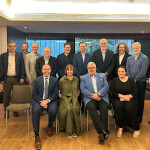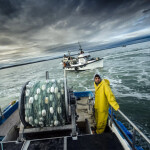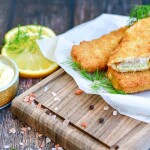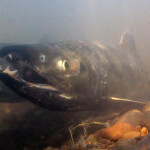Fish farmers should be glad, and proud, that a framework for organic seafood production moved a step closer to reality last week. But the National Organic Standards Board's latest action doesn't mean your local fish shop will stock "USDA Organic" salmon anytime soon.
Two major issues have slowed the development of organic seafood standards, which now await a U.S. Department of Agriculture review: the inclusion of wild fish in fish feed and the use of open-ocean net pens.
Aquaculture opponents' arguments against net pens have always had as many holes as the nets themselves, say fish farmers, including the potential for escapement and seafloor degradation. Organic fish farmers say nutrients from a salmon operation actually increase biodiversity in the surrounding ecosystem.
Dick Martin, president of Martin International of Boston, says that if organic standards for terrestrial species are possible, then standards for aquatic species should be as well. Martin's Black Pearl Shetland Organic Salmon, marketed under the Black Pearl brand, is certified organic by the Organic Food Federation in the United Kingdom and Naturland in Germany, which allows the company to market the fish as organic in the United States.
"If you have a field in a pasture to keep the cows in, you can have a pen to hold fish," says Martin. The vocal opponents of organic aquaculture, including Food & Water Watch of Washington, D.C., "came up with the same stale stuff" during the recent NOSB meeting, adds Martin.
A greater bone of contention, however, remains feed. Opponents decry the use of wild fish-sourced fishmeal and fish oil, and they gained a measure of victory in the latest ruling when a 25 percent fishmeal inclusion rate was deemed to be the maximum. Martin says raising salmon is not possible at this level.
Additionally, the NOSB's proposed requirement to capture at least 50 percent of nutrients from effluent is irrelevant for open-ocean aquaculture, says Neil Sims, president of Kona Blue Water Farms in Kailua-Kona, Hawaii, which farms kampachi, a carnivorous yellowtail species.
"All of the available evidence suggests that in open-ocean aquaculture there is no measurable nutrient loading in the effluent," says Sims. "If there is no impact, then what are we trying to save or preserve here?"
Farming finfish species like catfish and tilapia on a low-fishmeal diet is already standard practice, and such operations are typically inland or even indoors. Perhaps giving salmon (and kampachi) the stiff-arm is all groups like Food & Water Watch hoped for. If so, then mission accomplished.





